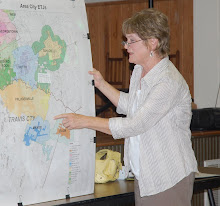Mary Anderson, director of Texans Against Tolls, has sent around a letter from the Save Our Springs Alliance to CAMPO against their plan to toll 290 East. The CAMPO board will meet on Monday, December 1, at 6 p.m., in the Joe C. Thompson Center, University of Texas Campus, Dean Keeton (26th Street) and Red River Streets, Austin.
The CAMPO board may decide to change 290 East to a toll road even though there are many reasons NOT to toll 290 East. Since the plan was presented to the public, the plan has changed, with higher tolls and fewer free lanes on the frontage roads. Given these changes, CAMPO should hold more public meetings to present the changes and to allow more public comment.
The Save Our Springs Alliance is asking for others to sign their letter and send it in to CAMPO. The letter makes many good points against tolling 290 East; you can use it as is, or make changes as you wish. Send your comments to CAMPO before the Monday meeting. Then attend the meeting to show opposition to 290 East tolling.
campo@campotexas.org
Here is the letter:
Open Letter to CAMPO on 290 East and Toll System Financing
December 1, 2008
Dear Senator Watson and CAMPO Board Members:
We urge you to reject the CTRMA’s 290 East financial proposal and send a message to your partners that toll system financing, or “cross-collateralization,” is not the way forward for this region.
In our view, a debt-financed toll system is an unsustainable and inequitable approach to transportation that will gravely damage our communities and environment. Approving the proposal reverses safeguards for financial transparency and accountability that CAMPO unanimously adopted only a year ago.
As a matter of timing, we believe it is wrong to schedule deliberation and action on this major debt commitment when the CAMPO board still has pro-toll "lame duck" members like Travis County Commissioner Gerald Daugherty and State Representative Mike Krusee. Both of these officeholders are leaving office, in substantial part, because voters opposed their support for toll roads.
In addition, making this decision in a CAMPO meeting immediately on the heels of the Thanksgiving holiday minimizes public oversight and participation. We request that you defer all action on this item until after new members are seated and adequate notice and information has been provided to the public. New CAMPO members with fresh perspectives on the region’s transportation issues should be given a chance to examine and weigh in on this radical CTRMA proposal.
The proposed cross-collateralization scheme currently on the table would tie 290East and 183A together. However, CTRMA and JPMorgan have made it clear they want to tie all of the Phase II toll roads together in one web of cross-collateralization. This is precisely the kind of "risk sharing" that has produced the current global financial crisis—the idea that bad bets get better when you make more of them and use them to "guarantee" each other against failure.
The 290 East project, standing alone, is not financially viable. It is not magically transformed into a financially responsible investment by bundling it with 183A. Passing this proposal now would be reckless. CTRMA and JP Morgan so far have failed to share essential information with the public and with CAMPO members. Basic traffic and revenue information for 290 East has not been released. The public has a right to know such details before any further actions are taken.
The proposed 290 East toll project is also unfair—disproportionately harming the health and living standards for low-income and minority populations along its path and imposing tolls on commuters living outside CAMPO boundaries. The 290 East Tollway would bring more pollution into our communities, only benefit those who pay tolls, and perpetuate sprawl.
Change in Washington DC should translate into change in Austin. President-elect Obama has called for a real commitment to reducing greenhouse gas emissions. The Phase II toll road system, including 290East, is in direct conflict with a sustainable, climate-friendly transportation system. With the change in national administration, more federal financial resources may become available for infrastructure, without the need for expensive and uncertain toll debt schemes.
Transportation spending priorities may change too, away from sprawl inducing roadways. President-elect Obama has called for investing in repair of existing roads and bridges. The Phase II toll system should be put on hold until we figure out how to fix and maintain what we have.
Any debt financing should be used sparingly—reserved only for projects that reduce vehicle miles traveled (VMT) and promote equity and sustainability. If we are going to call on our children to pay for our decisions today, then those payments should be for a safer, more sustainable future, rather than for projects that depend on repeating and expanding the mistakes of the past.
In conclusion, we respectfully request that CAMPO reject the CTRMA’s proposal and follow its own financial accountability safeguards that were approved unanimously less than a year ago. At the very least, CAMPO should delay voting on this ill-timed and uninformed proposal until new members are seated and essential information is released.
Thank you for your consideration.
Sincerely,
Undersigned
Subscribe to:
Post Comments (Atom)

No comments:
Post a Comment